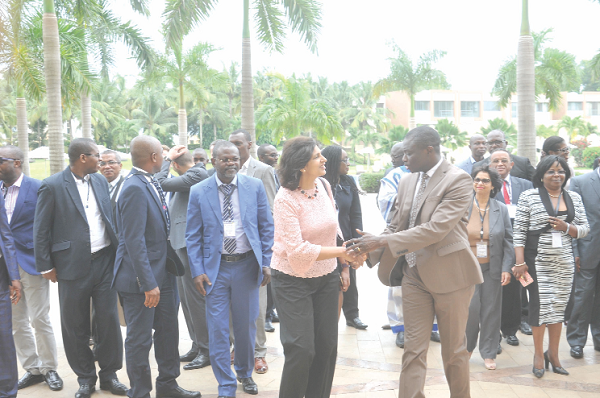
African countries meet in Accra
Delegates from 27 African countries who are members of the Global Forum on Transparency and Exchange of Information for Tax Purposes have gathered in Accra for the fifth Africa Initiative Meeting to discuss how to eliminate illicit financial inflows (IFFs) in Africa.
The two-day forum, which opened in Accra yesterday, is a follow up to the fourth global forum that was held in Yaounde, Cameroun, in November 2017, at which the issue of using tax transparency as a tool to combat IFFs in Africa was discussed.
Illegal financial inflows
The Global Forum is made up of 153 member countries, of which 27 are from Africa, the G20 countries and some large financial institutions, with the common objective of sharing information towards eliminating illicit financial inflows in the world.
Illicit financial inflows are illegal movements of money or capital from one country to another. Such movements become illicit flows when the funds are illegally earned, transferred or utilised.
They may include trade-based money laundering techniques used by a drug cartel to mix legal money from the sale of used cars with illegal money from drug sales or an importer using trade mis-invoicing to evade customs duties, VAT and other income taxes.
The term emerged in the 1990s and was initially associated with capital flight, but it now generally refers to cross-border movement of capital associated with illegal activity or, more explicitly, money that is illegally earned, transferred or used that crosses borders.
But there is an ongoing global discussion on whether commercial activities — such as tax avoidance — should be considered part of IFFs, considering that many business practices aimed at lowering tax liabilities are legal.
No agreement
For the World Bank Group, while the term “illicit financial flows” is increasingly used, there is still no agreement on the precise definition. It thus recommends that focus be placed on flows and activities that have a clear connection with illegality.
The Accra Meeting, among other things, is expected to bring the issues to the fore for the delegates to discuss the way forward.
Welcoming the delegates to the meeting, the Head of the Global Forum Secretariat, Mrs Monica Bhatia, said the meeting constituted one of the largest gathering of tax transparency experts since the launch of the African Initiative on IFFs in 2014.
She said the meetings of member countries were geared towards the common objective to combat tax evasion in Africa and how best all parties could work together within the framework of the African Union (AU) to promote the agenda.
Mrs Bhatia indicated that one of the objectives of the Accra Meeting was to translate statements into concrete actions and lay a solid foundation for achieving set targets.
“Tax transparency should serve as a foundation to fight financial crime, corruption and other global crimes,” she added.
Declaration
A Deputy Minister of Finance, Mr Kwaku Kwarteng, who represented the sector Minister, Mr Ken Ofori-Atta, noted that the Yaoundé Declaration had begun to yield positive results.
He based his assertion on the fact that the fifth AU and European Union Summit held a week after the fourth task force meeting in Côte d’Ivoire to promote the exchange of information among tax authorities in Africa to effectively address IFFs was on course.
He said another laudable outcome of the fourth task force meeting was members’ commitment to extend the Africa Initiative from 2018 to 2020 to promote the exchange of information on the continent.
“We believe there is more to be done with respect to infrastructure and capacity building, particularly in this new era when the exchange of information and beneficial ownership information requirements, among others, are automatic,” he added.
Cost of illegal flows
Mr Kwarteng quoted a report by the High Level Panel on IFFs from Africa which put such flows from the continent at an estimated $50 billion per annum, approximately double the official development assistance that Africa received.
“The report revealed that between 2000 and 2008, $252 billion in illicit inflows was from the extractive industries in Africa,” he said.
The Technical Advisor to the Commissioner General of the Ghana Revenue Authority, Mr Henry Yentumi, in his remarks, said weak internal systems created conditions for people to evade taxes, adding, however, that the introduction of tax identification numbers and the digital address system would make it possible to trace people and have them pay their taxes.
